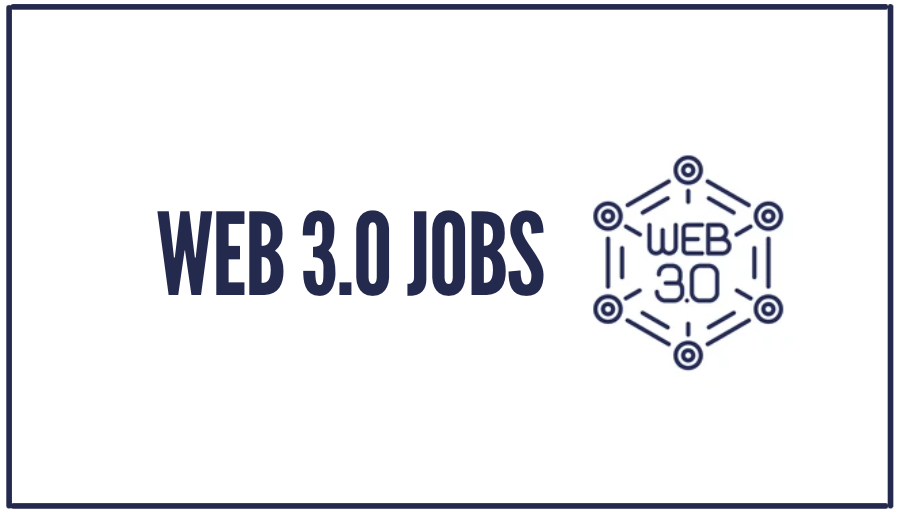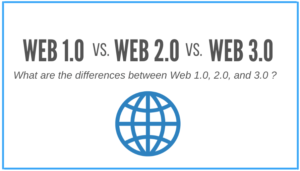The rise in interest in Web 3.0 jobs is slowly but steadily increasing. Recent college graduates and working professionals in various fields appear to have a strong interest in learning how to launch a successful career in Web3 and its numerous sub-sectors, such as the Metaverse, digital assets, and Non-Fungible Tokens (NFTs).
But what is Web3?
Generally, Web 3.0 encompasses the concept of a decentralized web. With decentralization, Web3.0 allows its users to create their own platforms where they own the content. Rather than a third-party web company owning the user’s content, as is seen in web2.0 (Web 1.0 vs. Web 2.0 vs. Web 3.0). Web3.0 also includes ideas like blockchain and cryptocurrencies.
These days, the decentralized web, also known as Web3 or a blockchain-based Internet, is becoming increasingly popular as the new version of the Internet. The concept of “new internet service” developed from decentralized Blockchains—the shared ledger systems being used by cryptocurrencies like Bitcoin and Ether, has been given the name “Web3”.
Let’s get technical, shall we?
With Web3 and its suite of JS libraries, you can communicate with an Ethereum node in your local environment or remotely. Simply put, Web3.0 provides an Application Programming Interface (API) for us to work with so that we may more readily interact with the blockchain. Web3 acts as a wrapper for JSON RPC and enables a remote or local Ethereum node connection through either an HTTP or an IPC connection. The Ethereum blockchain and your smart contract can communicate over Web3, which is essentially just a connection.
Top trends in Web3 jobs.
Below is a list of the top eight common trends that can be seen in the Web 3.0 market.
- Blockchain Engineer
People will most likely be required to operate within blockchains like Ethereum and Bitcoin, a new Web 3.0 job position known as the blockchain engineer. These (Ethereum and Bitcoin) are, for now, some of the largest blockchains in operation, backed by a team of blockchain professionals. This position requires the individual to build and develop apps by utilizing blockchain technology, evaluate blockchain applications, and use blockchain technology to construct an application or system that would be advantageous to the firm for which they are working.
- Smart contract developer
Smart contracts are agreements housed on a blockchain, like Ethereum or Solana. It involves multiple lines of self-executable code with specified conditions. Smart Contracts enable trusted transactions and contracts to be completed automatically and anonymously without banks or legal systems. Smart contract developers should understand how blockchains work. Use cases, specs, and other requirements can help smart contract developers choose the right platform. This position would generally require knowledge of JavaScript, NodeJS, React, and API connections.
- Solidity Developer
Many Web3 positions may already exist in the tech industry, but they are easily transferable to Web3. A Solidity developer is a blockchain developer who works on Ethereum-based systems utilizing smart contracts. For example, a Solidity developer’s job description can include the following:
- Creating and deploying intelligent contracts.
- Auditing smart contracts.
- Communicating with users to transfer business objectives into technical specifications.
This Solidity developer creates smart contracts that may be used on Ethereum by deploying transactions per second. For the Ethereum blockchain and for now, Solidity is the most popular choice among developers. Naturally, we anticipate additional normal language support and blockchain languages to emerge, as this is still a developing field.
- Unity Designer
If you are interested in the Web3 platform’s potential for use in the creation of video games, you might be a good candidate for the post of Unity designer. Unity is a widely popular tool that is used for the development of Web 3.0 or metaverse dApps (decentralized Apps). It is a game engine designed to produce games and experiences in 2D and 3D space and with the metaverse. The community that uses Unity is about to be ready for new ways of interacting with data, making gaining insights from that data easier. As a unity designer, you’ll need to investigate different building techniques and receive instruction on the necessary tools to create connected and immersive experiences that span the metaverse.
- Community Manager
Community managers follow through in specific channels and spaces, such as Discord and Telegram communities. They’ll need to promote their businesses on platforms like these. Community managers must use cryptocurrency and marketing to build a web3 project’s communications and brand. These web 3.0 jobs may also be referred to as crypto community moderators, roles responsible for managing blockchain communities.
Blockchain efforts can be a good investment with innovative community management. The trend is apparent, notwithstanding community managers’ underappreciation. The brand, influencers, enterprises, contributors, and freelancers usually also contribute to community-driven innovations.
- Content Creator
Content creators within the Metaverse, Web3.0, or NFTs have true potential. Creators are responsible for creating entertaining, instructive, or educational cryptographic content for any web 3.0 social channel or platform. Creating crypto-related material may involve authoring emails, blogs, technical reports, web3 news, advertorials, and project communications.
Creators focus on growing audiences by addressing their needs. With Web3, producers may construct a better community using social tokens, NFTs, and DAOs. In addition, web3 helps creators gain superfans. Web3 gives content creators a chance to escape Web2’s flaws. Web3 technology reduces or eliminates your reliance on centralized systems. Creators can post a crypto project video on TikTok, Twitter, Instagram, and YouTube.
- Web 3.0 Design
Small firms will require more freelancers, agencies, or in-house designers with a decentralized internet. Designers will play a vital role in developing Web 3.
Web3 jobs for designers will require skills such as designing user-friendly websites and creating a project’s look, layout, and website. Web3’s user experience and interface design are as crucial as Web2’s. Web3 design allows you to be funkier than you could get with Web2 design. Candidates would be in demand if they could design and create great user interfaces and experiences in JavaScript.
- Front-end web development
Front-end developers work to improve and change the code into a graphical interface to ensure all site information is shown in a consistent and user-friendly style. In addition, front-end engineers ensure website information is easily read across browsers, operating systems, and devices.
Front-end developers must provide a robust user interface for more crypto ventures. As a front-end Web3 developer, you’ll need the basics like HTML, CSS, and JavaScript, in addition to learning web3 coding languages like Web3.js and Ethers.js to improve. In addition, knowing about React, Next, Node, etc., are also helpful in Web3 and Web2. If you know JS, you could study Web3JS and EthersJS and construct smart contract apps in a week or two. The people that know these are in high demand. Unfortunately, many people who work on smart contracts don’t like front-end implementation. Thus, many teams need help with both.
Final Thoughts
Blockchain technology has given millions of people the ability to choose how they make a living, giving them choices that did not previously exist for them.
People interested in entering the domain of Web3 jobs will need to be current on the most recent trends and technology because it is a field that is only starting to emerge. When it comes to continually improving your technical skills, a firm grasp of blockchain technology and decentralized financial systems will provide you with a solid foundation.

Nilesh Katuwal
Writes about blockchain, games, NFTs, DeFi, Metaverse, and Crypto.



